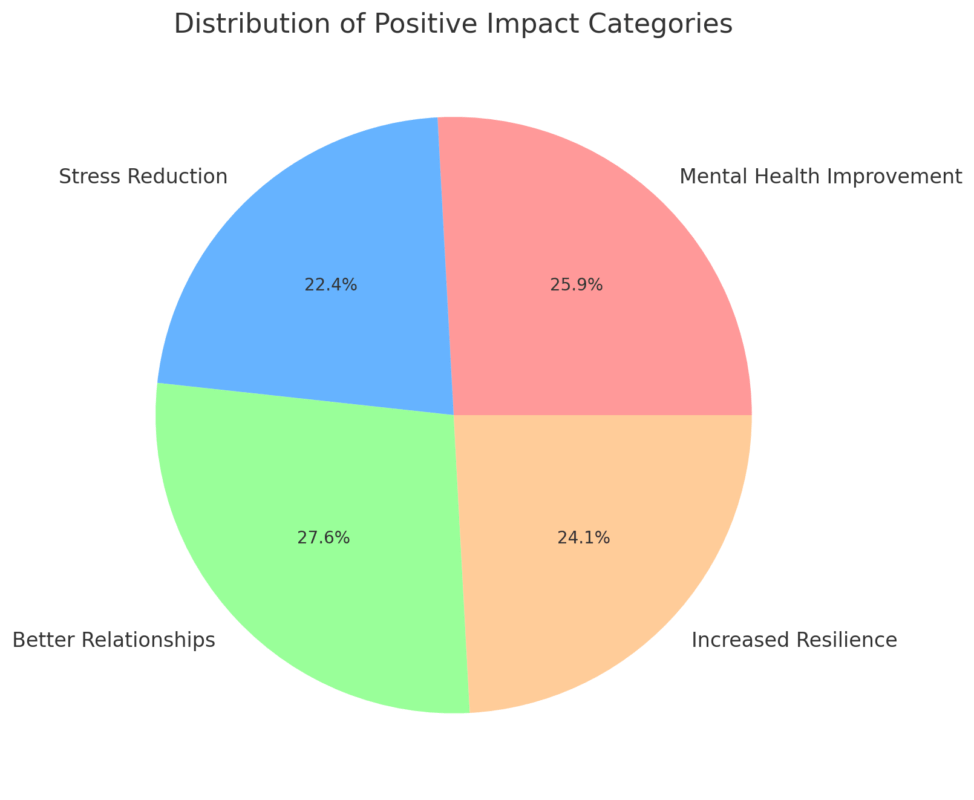The Power of Positive Thinking in Daily Life
“Your positive action combined with positive thinking results in success.” – Shiv Khera. This quote beautifully encapsulates the essence of positive thinking and its profound impact on our daily lives. In today’s fast-paced world, maintaining a positive mindset can be challenging but incredibly rewarding. By understanding and harnessing the power of positive thinking, we can improve our mental health, manage stress better, and enhance our overall well-being. Let’s delve into how positive thinking can transform your daily life.
What is Positive Thinking?
Positive thinking is more than just being happy or displaying an upbeat attitude. It is a mental attitude that focuses on the bright side of life and expects positive results. According to psychological research, positive thinking rewires our brain, impacting our mental and physical health. By focusing on positive thoughts, we can improve our brain’s functioning, reduce stress levels, and increase our overall happiness.
Positive Thinking Benefits
Improved Mental Health
Positive thinking significantly impacts our mental health. Studies have shown that individuals who practice positive thinking are less likely to suffer from anxiety and depression. By maintaining a positive outlook, we can create a mental environment that fosters happiness and reduces the impact of negative emotions.
(Consider Interlink to Overcoming Self-Doubt: Tips for a Confident Life)
Enhanced Stress Management
Managing stress is crucial in today’s hectic world. Positive thinking techniques, such as reframing negative thoughts and focusing on solutions, can help reduce stress. By maintaining a positive mindset, we can approach stressful situations with a calm and composed attitude, leading to better outcomes.
Better Relationships
Positivity plays a crucial role in building and maintaining healthy relationships. When we approach interactions with a positive attitude, we are more likely to communicate effectively and resolve conflicts amicably. Positive thinking helps us see the best in others, fostering stronger and more meaningful connections.
Increased Resilience
A positive outlook helps build resilience, allowing us to bounce back from setbacks more effectively. By focusing on positive aspects and learning from failures, we can develop a mindset that views challenges as opportunities for growth.
Overall Well-Being
Positive thinking impacts our physical health and overall well-being. Research indicates that individuals with a positive mindset experience better cardiovascular health, stronger immune systems, and lower rates of chronic diseases. By cultivating positivity, we can improve our quality of life.
Developing Positive Thinking
Steps to Develop Positive Thinking Habits
Cultivating a positive mindset requires practice and commitment. Here are some practical tips and strategies to develop positive thinking habits:
- Start your day with positivity: Begin each day with positive affirmations and a grateful mindset.
- Surround yourself with positive influences: Spend time with people who uplift and inspire you.
- Practice mindfulness: Engage in mindfulness exercises to stay present and focused on the positive aspects of life.
- Challenge negative thoughts: Identify and reframe negative thoughts to view situations from a positive perspective.
(Interlink to How to Stay Motivated Every Day: Simple Habits for a Better Life)
Positive Thinking Exercises for Everyday Use
Incorporating positive thinking exercises into your daily routine can make a significant difference. Some effective exercises include:
- Gratitude journaling: Write down three things you are grateful for each day.
- Positive visualization: Visualize successful outcomes for your goals and aspirations.
- Affirmations: Repeat positive affirmations to reinforce a positive mindset.
(Interlink to 5 Daily Routines That Boost Motivation and Productivity)
Role of Affirmations and Self-Talk
Affirmations and self-talk are powerful tools for developing a positive mindset. By using positive affirmations, we can reprogram our subconscious mind to focus on positive outcomes. Self-talk, or the internal dialogue we have with ourselves, significantly impacts our attitude and behavior. Positive self-talk can boost confidence and reduce the impact of negative thoughts.
(Interlink to Overcoming Self-Doubt: Tips for a Confident Life)
Mindfulness and Meditation Techniques
Mindfulness and meditation practices are effective in promoting positive thinking. These techniques help us stay present, reduce stress, and enhance our overall well-being. By incorporating mindfulness and meditation into our daily routine, we can cultivate a positive mindset and improve our mental health.
Setting Realistic Goals
Setting realistic and achievable goals is crucial for maintaining a positive outlook. When we set and achieve small, manageable goals, we build confidence and motivation. This positive reinforcement encourages us to continue striving towards our larger objectives.
(Interlink to How to Stay Motivated Every Day: Simple Habits for a Better Life)
Positive Thinking Techniques
Visualization
Visualization is a powerful technique for developing positive thinking. By imagining successful outcomes and visualizing our goals, we can create a mental blueprint for success. Visualization helps us stay focused and motivated, reinforcing our positive mindset.
Gratitude Practice
Practicing gratitude is one of the most effective ways to cultivate positivity. By regularly reflecting on the things we are thankful for, we can shift our focus from negative aspects to positive ones. Gratitude practice enhances our overall happiness and well-being.
Journaling
Journaling is a valuable tool for positive reflection. By writing down our thoughts and experiences, we can process our emotions and gain insights into our mindset. Journaling helps us track our progress and identify areas for improvement.
Positive Thinking in Action
Real-life examples and success stories can inspire us to adopt positive thinking. Hearing about others’ experiences and how they transformed their lives through positivity can motivate us to do the same. These stories demonstrate the tangible benefits of maintaining a positive mindset.
Support Systems
Having a support system is crucial for sustaining a positive mindset. Friends, family, and like-minded individuals can provide encouragement and reinforcement. By engaging with a positive community, we can share experiences, gain support, and stay motivated.
Positive Mindset Tips
Daily Positivity Tips
Incorporating small, positive actions into our daily routine can make a big difference. Here are some quick and easy tips to stay positive throughout the day:
- Smile more often: Smiling releases endorphins and boosts our mood.
- Practice deep breathing: Deep breathing exercises can help reduce stress and promote relaxation.
- Engage in physical activity: Regular exercise enhances our mental and physical well-being.
- Spend time in nature: Connecting with nature can uplift our spirits and provide a sense of calm.
Avoiding Negativity
Recognizing and steering clear of negative influences is essential for maintaining a positive mindset. Avoiding negative news, toxic relationships, and self-criticism can help us focus on the positive aspects of life.
Positive Thinking Resources
Books, apps, and other resources can aid in developing a positive mindset. Some recommended resources include:
- Books: “The Power of Positive Thinking” by Norman Vincent Peale, “The Happiness Project” by Gretchen Rubin.
- Apps: Headspace for mindfulness and meditation, Gratitude for gratitude journaling.
Long-Term Benefits of Positive Thinking
Sustained positivity can lead to lasting changes in our lives. By consistently practicing positive thinking, we can improve our mental health, enhance our relationships, and achieve our goals. The long-term benefits of positive thinking are immense, contributing to a happier and more fulfilling life.
Community Involvement
Engaging with like-minded individuals and communities can reinforce our positive mindset. Participating in community activities, volunteering, and joining support groups can provide a sense of belonging and encouragement.
Conclusion
In conclusion, the power of positive thinking in daily life is undeniable. By adopting a positive mindset, we can improve our mental health, manage stress effectively, and enhance our overall well-being. Start incorporating positive thinking techniques and exercises into your daily routine, and witness the transformation in your life. Remember, a positive mind leads to a positive life.

Fiction vs Fact Table
| Fiction | Fact |
|---|---|
| Positive thinking means ignoring reality. | Positive thinking involves acknowledging reality and focusing on constructive solutions. |
| Only naturally optimistic people can think positively. | Anyone can develop a positive mindset with practice and persistence. |
| Positive thinking guarantees success without effort. | While positive thinking is powerful, it must be combined with action to achieve success. |
| Positive thinking is just self-deception. | Positive thinking is based on realistic and optimistic attitudes, not self-deception. |
| Positive thinking is the same as wishful thinking. | Positive thinking involves setting realistic goals and working towards them with a positive attitude. |
Interlink Opportunities:
- Improved Mental Health – Consider linking to Overcoming Self-Doubt: Tips for a Confident Life here to guide readers on improving their mental health further.
- Steps to Develop Positive Thinking Habits – Link to How to Stay Motivated Every Day: Simple Habits for a Better Life to provide readers with additional habits that boost motivation.
- Positive Thinking Exercises for Everyday Use – Interlink with 5 Daily Routines That Boost Motivation and Productivity for readers to find more daily exercises.
- Role of Affirmations and Self-Talk – Include a link to Overcoming Self-Doubt: Tips for a Confident Life to provide readers with strategies to combat self-doubt.
- Setting Realistic Goals – Another opportunity to link to How to Stay Motivated Every Day: Simple Habits for a Better Life for practical goal-setting advice.







